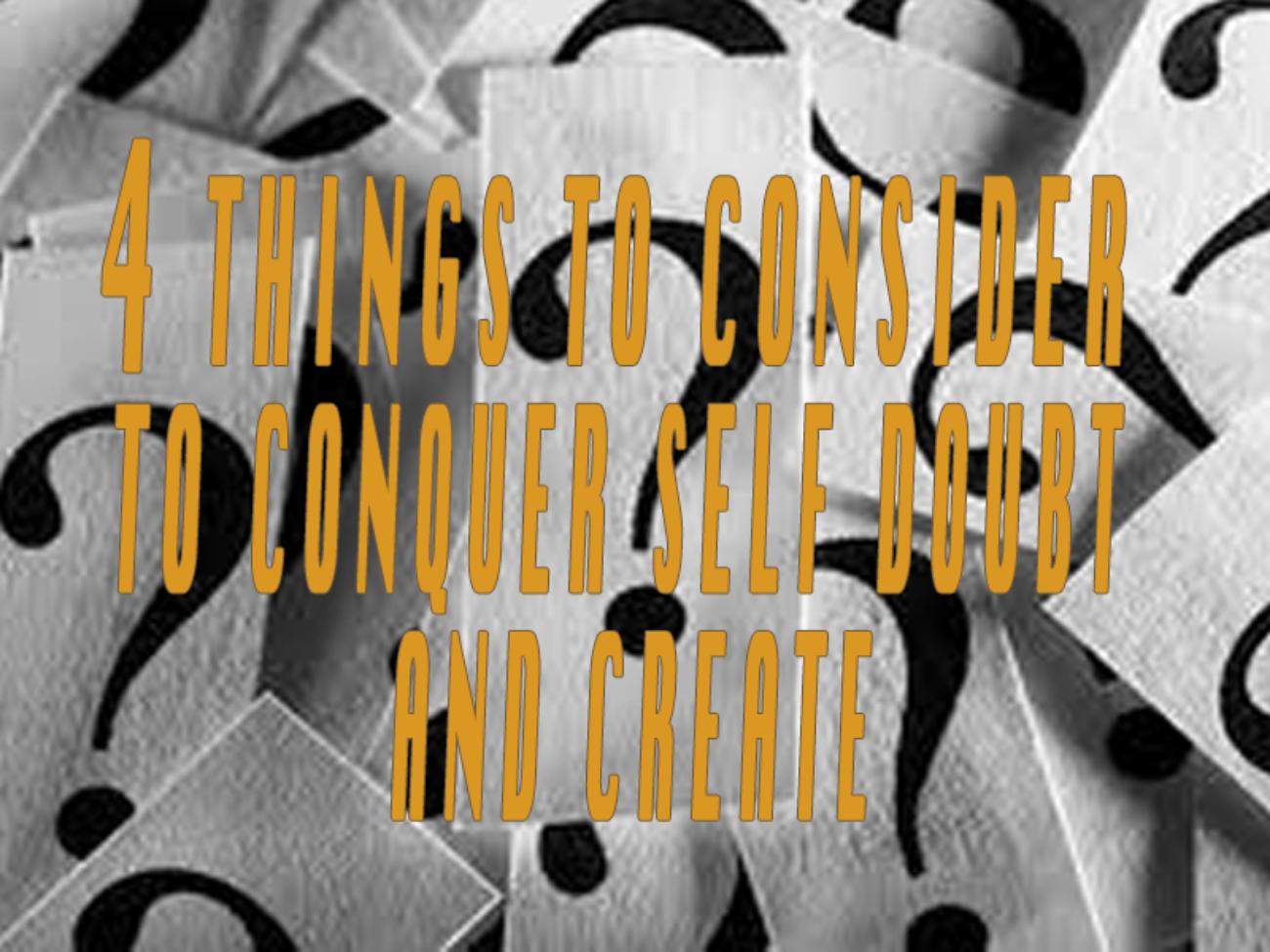Achickwitbeatz presents the Instrumental Intel podcast, bringing you information instrumental to your artistic career including music industry news & tips, insights & interviews, and beats for your inspiration. Listen on Saturdays at 7 pm EST on Grander Radio and Achickwitbeatz.com.
Follow on Facebook, Instagram, Twitter, YouTube Audiomack & SoundCloud, and subscribe on your favorite podcast platform. Download the Grander Media app to listen to Grander Radio on the go.
- Art
- Independent Labels
- Internet Radio
- Music Documentaries
- Album Reviews
- Music History
- Music Industry News
- Free Game Friday
- Free Downloads
- Poetry
- Books
- Interviews
- Did You See It?!
- Hip Hop History
- Hear Here
- Music News
- Hip Hop Documentaries
- Music Marvels Radio Show
- Think Piece Thursday
- Mini Documentaries
- Instrumental Intel
- Music Humor
- Indie Analysis
- Conversations & Quotables
- Music
- Resources for Artists
- Podcasts
- Beats/Instrumentals
- Music Education
00:02
Hey, thank you for tuning in to Instrumental Intel. I am your host, music producer Achickwitbeatz, and I'm glad that you're here with me. Today's episode has music industry news, of course, Instrumentals by Me for your inspiration. And later, my special guest, Chris Ivy, will be coming to join me. We're gonna talk a little bit about storytelling through Southern Soul and much more. So I'm excited to be bringing this episode to you. But before I get started, I gotta give a shout out to my home station, Grander Radio out of Grand Rapids, Michigan. And with that,
00:30
Let's go!
[BEAT BREAK]
13:03
Alright, and I'm back with the music biz brief. First up, the US Senate voted 99 to 1 to strike a proposed 10-year ban on states regulating AI, which was originally introduced by Ted Cruz as part of a broader reconciliation bill. The ban had backing from major tech leaders like OpenAI's Sam Altman and others, who claimed it would prevent a messy patchwork of state laws.
13:25
But lawmakers on both sides of the aisle pushed back, warning it would strip states of oversight power and let AI companies operate unchecked. After last-minute negotiations fell through, the provision was removed with near-unanimous support. Next, two AI-linked artists are gaining major traction on Spotify, raising fresh questions about transparency and authorship in the streaming era. A mysterious band called Velvet Sundown has racked up over 550,000 monthly listeners in just a few weeks, with no known members,
13:55
two full albums and what appear to be AI-generated photos. Spotify hasn't commented, but Deezer has flagged some tracks as possibly AI-made. Meanwhile, outlaw country act Aventus has quietly surpassed one million listeners. A forensic analysis found that nearly all of his music was generated using AI tools, Suno, and Riffusion. Another artist, The Double Inside, showed similar patterns.
14:22
As AI-driven tracks continue to make it onto algorithmic playlists, concerns are growing around attribution, royalties, and whether minimal human input, like writing lyrics, is enough to claim ownership. AI music platform Suno and UDO are both pushing out new creator tools while facing mounting legal pressure over copyright issues. Suno just acquired WaveTool, a browser-based AI DAW known for stem separation and audio editing features.
14:48
The tech will power Suno's upcoming editing interface, designed to appeal to songwriters and producers. The acquisition was announced shortly after Suno was hit with another copyright lawsuit, this time from country artist Tony Justice and Fifth Wheel Records, adding to the legal heat for major labels. Meanwhile, UDO is also being sued by the majors, and Tony Justice has launched Sessions, a visual editing tool for AI-generated tracks that lets users tweak specific parts of a song by section.
15:17
It builds on UDO's earlier tools, like style matching and fast generation speeds. While both companies are in talks with labels about licensing, they're continuing to develop features aimed at becoming part of artists' despite concerns they're profiting from copyrighted material without permission. Next, a new startup called Songscription has launched an AI-powered tool that quickly transcribes audio into sheet music, targeting both pros and hobbyists.
15:45
Users can upload files or paste YouTube links with the platform generating sheet music, piano rolls, and soon guitar tabs and full band arrangements. Operating on a freemium model, Songscription positions itself as a tool to speed up music notation, not generate new content, though its ability to transcribe copyrighted material raises legal questions. The company has backing from Reach Capital and is joining Stanford's StartX Accelerator. Also, Soundstripe has launched Soup,
16:14
an AI-powered search assistant that helps creatives quickly find the right music, sound effects, or video clips for their projects. Users can search using natural language, creative briefs, or even images, and refine results from Soundstripe's catalog of over 50,000 tracks. Designed to work like a virtual music supervisor, Soup aims to simplify the licensing process for creators under tight deadlines. All right, next in news, Spotify is giving users more control over their Discover Weekly playlist.
16:44
Now genre buttons like pop, R &B, and funk will appear at the top, letting listeners shape what kinds of music they want more of. The playlist has generated over 100 billion streams, but some users complained about repeated songs and inaccurate genre tagging. Spotify recently updated its recommendation system and is also rolling out new cover art. For indie artists, this is the kind of hands-on personalization that could shift how people find new music and who gets hurt.
17:11
Also, Instagram now lets users hear song previews directly in stories when music is shared from Spotify, a change from the previous link-only format with no audio. The update makes music discovery smoother without leaving the app and follows a similar feature recently added to Instagram Notes. As Instagram builds out music tools to rival TikTok, it's also rolling out new fonts for stories and reels, including a limited-time option inspired by a popular artist's handwriting and symbols.
17:39
Next, Rumblefish, part of the Seasack Music Group, has struck a deal with ByteDance to handle music licensing and royalty services for TikTok and CapCut. The partnership lets music publishers directly license their catalogs to both platforms with support for multi-territory deals based on rights coverage. Rumblefish will manage everything from linking song and recording data to processing royalties and usage reports.
18:02
Also, Vinyl Group has secured a $1.5 million revolving credit line from major shareholder Song Trader to help boost sales on its Vinyl.com marketplace during the 2025 holiday season. The two companies also reached an agreement in principle for Vinyl Group to acquire the Vinyl.com domain and settle historical liabilities pending shareholder approval.
18:24
So this deepens their strategic partnership as Vinyl Group continues expanding with its music-focused portfolio, which includes Vinyl.com, Jaxta, Vamper, and Vinyl Media. Next up, some Warner Music news. Warner Music Group and Bain Capital have launched a $1.2 billion joint venture to acquire major music catalog spanning both recorded music and publishing. Warner will handle marketing, distribution, and administration, while the two firms share equal financial responsibility.
18:53
The venture is already eyeing high-profile deals, including a possible $350 million purchase of the Red Hot Chili Peppers' catalog. Positioned as a new destination for legacy artists, the partnership aims to expand the reach and value of iconic music catalogs through long-term stewardship. And in the same breath, Warner plans to cut an additional $300 million in annual costs by the end of fiscal 2027, with $170 million saved through layoffs.
19:20
This is the final phase of CEO Robert Kinkel's restructuring plan, which, combined with earlier cuts, brings total projected savings to over $560 million. While some roles will be eliminated, Warner says the move will help fund growth in A&R, catalog acquisitions, and artist services. All right, UK licensing body PPL paid out £96.7 million, which is approximately $133 million.
19:48
to 139,000 performers and recording rights holders in the second quarter of 2025, down 7 % from last year's record-breaking quarter. The payout covers public performance and broadcast royalties from 2024, along with revenue from international CMOs in countries like the US, France, and Japan. Over 6,400 recipients received their first PPL payment in this cycle.
20:13
Since January, PPL has distributed 167.8 million pounds, which is about $230 million, and continues expanding its global reach through new international collections and video licensing via sister company, VPL. Also, Sony Music France and Sony Music Publishing France have acquired Lusafrica and its publishing arm, Africanostra, home to over 4,000 titles spotlighting Lusophone and African artists. Founded in 1988,
20:43
Lusafrica helped launch the global career of Cape Verdean icon Cesaria Evora. The catalog includes Evora's full discography and hits from other popular artists with strong followings in the US, France, and Latin America. Sony says the deal strengthens its presence in high-growth markets and aims to introduce this world music legacy to new generations and territories. Alright, and finally, pop music is hitting a summer slump.
21:09
Unlike last year's flood of breakout hits and defining anthems, 2025 has yet to deliver a standout, quote-unquote song of the summer. New tracks from names like Alex Warren and Sabrina Carpenter are topping charts briefly but failing to actually resonate. Music execs blame a mix of political unrest, overstimulated audiences, and a creative hangover from 2024's Popeyes. With fewer fresh releases and listeners leaning into nostalgia,
21:35
The season's usual soundtrack of carefree group anthems is noticeably missing, leaving a void indie artists might be well positioned to fill. Alright, and that's it for this music biz brief. I'm gonna take a quick pause for the cause, and then I'll be back with my special guest, Chris Ivy, right after this. Keep it locked!
22:12
[BEAT BREAK]
33:57
Hey, I'm Achickwitbeatz, multi-genre music producer and strategist to indie artists and labels. Visit achickwitbeatz.com for resources for artists and instrumentals in various genres available for songs, vlogs, blogs, podcasts, themes, TV, film, commercials, and more. Once again, that's achickwitbeatz.com. That's A-C-H-I-C-K-W-I-T-B-E-A-T-Z.com. Let's make something happen.
34:25
Let's make something happen. Hey, thank you so much for tuning in to instrumental Intel. I'm your host, music producer, Achickwitbeatz. And I'm thrilled to say that I have in the virtual building with me on the line is Chris Ivy. If you could give everybody a little bit of background as to who you are, where you're from, and how you got involved with music. Well, a child, I just, I found myself just loving music, you know, different sounds from, uh,
34:55
New Edition, Hi-Five, H-Town, R. Kelly, and guys like that. So I always had the ability to kind of mimic different voices. And early on, you know, when you're young and singing in the tub, just having fun, could, you know, some people probably telling you that you could sing this and that, but not hearing yourself, you wouldn't know whether or not it's true, other than some friends just kind of egging you on or whatever. So let's fast forward to many years later.
35:25
It had been around 2008. I had a friend of mine who wanted to start a band. I always did want to sing, but a band probably wasn't my first choice. At that point, I said I didn't have much of a choice, so I decided to go along with it. We rehearsed for about a couple weeks. For whatever reason, I just wasn't feeling it. Deep down, I kind of wanted to do my own thing.
35:53
I guess I didn't know how to say it. So I kind of fell off for a minute and came back maybe six months later. And at this time they wasn't really doing the band thing again. My friend had opened up a recording studio, and during that time they were recording this young guy, it was a rap track. And I got a chance to talk to the producer after everything was over, we chopped it up. I actually had to take him home that night.
36:23
So when we was on our way home, we would just started talking about music and he was asking me some of my favorite artists and at that time, H-Town was my favorite group and I very, very much loved Dino, the lead single for us. And he heard me hit a note, give me some good love. He said, dude, he said, man.
36:50
I was gonna make you a household Southern Soul name. And at the time I wasn't familiar with Southern Soul words. But I was like, hey, let's give a shot. And we pretty much started recording maybe a couple of weeks after the end. In late 2008, 2009. Wow. I just want to say you hit that Dino, though. That was perfection. Sounded like you pressed play real quick. Like, okay. Yeah.
37:18
Okay, so 2008/2009… Yeah, and at that time, being from a small town more Mississippi, I was jobs was pretty much limited and most of my friends kind of had things that they could do and I've worked in like the manufacturing industry tool and dime maintenance and welding, and stuff like that, so
37:43
These jobs have been kind of closed down left and right and I asked God I just wanted something that I could kind of do on my own that would you know be based on my own talents. One of my friends is dead they own an air-conditioned refrigeration business. One of my other friends he cut hair so everybody had a craft or something that they could do. So I wanted to sing and I didn't know how I'm gonna put it together and thanks to Mr. Treville Williams.
38:12
We were able to get it done. Um, I remember one day I came up with an idea for a song. was listening to, um, the Southern soul game, and I was wondering who had the hot tracks at the time. So I thought about my friend, LJ uncles. He had a song called, uh, hit it from the back, and Nathan you came up, had a song called, can you back it up? And me being from my hometown, we had Mississippi. said, you know what?
38:42
Nobody has ever done a song about a turn road. Now up there in y'all might call it the back road, Lovers Lane. It's pretty much somewhere where you can go and have relations in the back seat of a car, truck, van, bus, know, whatever the deal is. So as I was getting ready for work, I call Travella. And it hit me. His hymn just came to me. It was like, you can look crazy.
39:12
or you can turn it up your nose. But you ain't never made love till you did it on a turn-rope. I had to beat it up, beat it up on a turn-rope. He said, dude. Right. he happened to put a track with it, and that pretty much got my feet wet in the Southern Soul industry. Wow. OK. I kind of got to back up a little bit.
39:41
So when you mentioned like some of your favorites and how, when he said, okay, I got to put you up on this game. You like, see how I fit in. How can I say this from what you've grown up listening to, to him proposing that to you, how quickly would you say the turnaround was like before you were like, yeah, no, okay. Now I know what you're talking about. Definitely. I got this. Right, right. Well, it wasn't, it wasn't too long. And I can kind of thank a lot of those guys for kind of, uh,
40:11
molded me, you know, just hearing those different voices, they get different runs. And now that I got an opportunity to do my own thing, I kind of add a little, you know, a little seasoning from maybe a little R Kelly, a little Dino and just put it in and blend it with some Chris Ivy. Then we got a whole nother sound going on. Yeah. And yeah, shout out to Hi-Five too. Like I don't feel like they get brought up enough.
40:34
Right. Oh yeah. Tony Thompson was my dude, know, Kissing Game and Can’t Wait Another Minute, Quality Time. It was years of me. My mom gave me old minivan and I used to ride around a lot of friends sometime that used to be, you know, in the van and they're like, Why is this dude always listening to slow music?
41:01
I mean, of course I had no problem with my sexuality. I'm a man, man. I just, like music, but at the time I didn't know that I was being groomed. That one day I would be a singer for real. Yeah. Yeah. Actually they used to make fun of me. Used to my van the H-Town Bus. If you know you, Chris picking you up. You're going to be listening to some Back Seat (Wit No Sheets), Emotions and Knockin’ Da Boots, and having a good old time. I love it. That's hilarious.
41:31
Oh yeah, definitely a classic era for R&B music. But, yeah, so you talked about how, you you came up with the hook and everything, like for the one track, but typically how do you kind of get involved, I guess, like if you decide, okay, I'm going to sit down and write this or does something just hit you? You know, you have to have... Since I've been doing it now, Trevail mostly did most of the writing.
42:00
I would come up with a hook and he kind of, you know, he did the writing. But as I got a little more seasoned in the game, I worked with artists like Lacey, Jeff Floyd, and I'm starting to really get it now, how to write and go. So now if a hook or something comes to my head, I'm able to place it where it need to go. I'm good at filling in the blanks. For the past eight, nine years, I've been writing all my own music.
42:29
My last one is called, I just dropped it about a month ago. It's called the whiskey made me do it. Now most people will probably say whiskey, but my brother, when he get a little tipsy, he can't say whiskey. So I kind of made fun of him a little bit. He saying whiskey. The whiskey made me do it. Boy, that whiskey is hitting good, bro. know? So I came up with that, you know, it was like,
42:57
The whistle made me do it I slept in my truck baby all night long The whistle made me do it I put my number in your best friend's The whistle made me do it Tip toe in the door like six in the morn The whistle made me do it The whistle made me do it So it just kind of like telling a little story I love the story telling style of writing
43:23
Yeah, and it's interesting that you explained that because I was actually going to be my next question. Once you were talking about writing everything. So, Fabian, shout out to him. He sent me that track when he was telling me about you. And that's the first thing that caught my attention. I'm like, wait, this don't say whiskey. Now that I would have been expecting. So, you know, like it automatically kind of drew me in like, all right, let me, me hear this and I would flow. And so, yeah, like the.
43:50
The storytelling, I think, is one of my favorite things about it. Of course, you're singing your heart out, wonderful track, beat, like everything just kind of gels. But yeah, like you're painting a picture the entire time, and it's like, okay, I'm kind of visualizing everything that you're saying. So yeah, really dope job. So, you know, in order to kind of crank that stuff out, you know, what do you do to kind of set the mood each time that you sit down to write?
44:19
Well, honestly, I'll probably get me a little, little sip of some vodka. And once I'm in that mode, it just I get, you know, very blessed to be in, you know, the opportunity to, to be doing this. And I was once a fan and I kind of know what, you know, what the listeners are looking for. And I just plan on not disappointing. So music to me, especially with writing and performing, it is a feel.
44:48
And from when I first started, I was just, you know, I wouldn't say I was afraid, you know, I just called it being green. I was just seeing. And but now, at where I'm at in my career, I want to try to capture that feel. I want that feel to come through the radio waves instead of just a good voice. I want the soul and everything just to pull out and try to get the people that way.
45:14
So yeah, the truth serum helps a little bit. I think that's a Ernest Hemingway, the right drunk and edit sober. Yeah. So I get it. It kind of helps loosen you up so that way you can just let it flow the way it is. Yeah. Yeah. When I'm not doing music, we sit around and play dominoes and spades and all that stuff. So.
45:40
You know, that true serum, it really is kind of like all-purpose. Yeah. That's a great way to put it. Right. Well, you know, I do it all to ego. So my name is Chris Ivy, but most of my friends know me as Ivy. So I feel there's a story there. Go ahead. Yeah. Well, it came pretty much because my name is Bill Ivy. Ivy why?
46:08
And for the most part, I don't know why people used to seem like I can't, this guy don't know how to spell his name. They will always include an O-R, it'll be Ivory. I've been Ivy E-Y, I've been Chris Ivan. And I love the commercial, I'm like, you call and book me for a show. My Facebook page, IG, TikTok, all this says Chris Ivy Y. But when you put me on the fly, you can put an O and an R.
46:37
But coming there, it was so agitated. So therefore, Ivy just took. It called me Ivy or someone just called me Ivy and just let's be through with it. Gotcha. Man, that is so frustrating, especially, like you said, on the flyer. It's like, OK, well, I want to share this with people, but not with it spelled like that, please. Thank you. Please get my name right. Yes.
47:03
Okay. So let's talk about that from the time that you recognize, okay, I'm wanting something. And, know, from the first track that you very, like the very first one that you ever put out compared to where you are today, what are some of the major changes that you've seen happen within the industry? Well, social media has helped the game a whole lot. TikTok and all those things. They wasn't really as popular.
47:33
back in 2009, 2010, and you would mostly have to rely a lot on radio. With radio, think it still is the best, but you still can get a lot of fans and listeners through social media now. The leg was much harder, but now you can just upload a track and it becomes viral running this. Just like this young guy that just came out, 803 Fresh.
48:02
Um, he come out with a song called boots on the ground and Lord have mercy everywhere. mean, say, it in one of her shows, I'm like, dude, you really, you know, for this journal, not, not to be really recognized, uh, Southern soul. I know blues is recognized, but not Southern soul, what they call it, you know, uh, but to have, uh, people like Beyonce and, and Fantasia, know, coming out, singing that track, um,
48:31
at their show, that's huge. And also the young man got blessed to perform at, I think, the BET Awards and the halftime of the NBA final. there's, but yeah, that's a different type of thing. We got all the social media and stuff like that, and it makes the process so faster. Yeah. Which, paradoxically, can sometimes make things even harder.
48:54
Cause it's like, you know what I mean? Now that it's so easy for everybody to get visible, it's like you kind of fighting for views and stuff these days. um, yeah, I mean, that's one of the major changes I've seen least since I've been doing this. And, you know, I'm kind of grateful for a lot of times people bring up like the transition from analog to digital. And I have so much respect from those who had to start like with the analog era.
49:21
Cause yeah, I don't think, I don't know. can't say for certain that I'd be doing it today if I still had to do stuff that way. yeah, definitely the access has changed tremendously. And so with that, like you've even mentioned that you've had some collaborations with, you know, some great people. How would you say that it's affected you and like choosing collaborators? Like maybe somebody that you didn't know personally, but because of the internet, now you know, if you want to work with them.
49:51
Right. It is so much easier. You can get a feel for them, they sound, and how well they collabed with others. It makes it a lot more easier. And I'll say another thing, since this whole deal started, it's so easy to get into a studio versus back in the days. There are lot of producers and most of guys are good.
50:21
The worst thing I seen was a person that could sing real well, but the production is trash. So no matter how good you can sing, if that production ain't right, it's not going to work. But now you just have so many good producers, great producers that able to kind of help you achieve your goals and make good collaborations possible across the country. Yeah. So what are some of things that you look for when...
50:49
thinking about collaborating with somebody? Because most of the people who listen to this are actually creatives. So you have somebody that listens to you sing and they like, ooh, I want to work with him. What are some of the things you look for? Well, honestly, I'm not, you know, back in the days, I was kind of coached mentor by some of the greats and I just always wanted to pull my own weight. I don't have nothing against collaborating, but I seen how that could kind of, you know,
51:17
hinder your growth a little bit. I won't call no names, but you know, if you got somebody that's super popular, you know, with 10 million followers or what have you. And at the end of the day, if you're not just as known as that person, when you collaborate with that person, even though it's your song, from my experience, it has been more about that person instead of you. And I didn't wanna, you know, never try to get on that way.
51:47
So I just kept it down until I'm able to pull my own weight. And then maybe so. Okay. What about somebody that doesn't have a bunch of followers? You know, maybe they just kind of starting off, maybe y'all kind of parallel as far as that goes. What would it take for you to consider working with them? Oh, I don't mind helping anybody. I mean, you know, if they would like to, you know, want to reach out, I would mind. Okay.
52:14
A lot of times, sometimes people are like, okay, well, you you just can't have no attitude. But I know when you mentioned pulling your weight, that's something that not every artist kind of understands how that works, especially when you're trying to be creative. And then sometimes you have people who have, you know, maybe like the more business minded approach of it. Because I know I've been in situations like that to where it's something that you could probably tweak later on. But when it comes into the vibe session too quickly, it can kind of shut everything down.
52:43
Because if that actually creating the art, now you worrying about how to sell it before you even finish making it.
52:50
Yeah, so like do you have any advice to anybody trying to avoid those types of pitfalls and just keep the creativity flowing? Yeah, I would just say a lot of the stuff most people get into the what's trending and I will always just try to just let it come from your heart. Just try to stay true to yourself and
53:15
Maybe it might not be hitting today, but in the next year or so it might, you know what I mean? I don't just, what they call it monkey see monkey do, just stay true. Just stay true and do you. Yeah. If you've seen like some of the catalogs and stuff deals that have been going on over the last few years, most of those have been from like legacy artists. So not to say that there's anything wrong with trends, but
53:41
Yeah, it's like that's where people are kind of banking their money. Like, okay, I might like this song today, but you know, 10 years from now, I could probably make more money off of this because you hear it in a Citibank commercial. what's the, I can't think of the credit card company, but the one playing Lil' Kim. I'm like, I never would have imagined hearing Lil' Kim music from the early 2000s in like a major commercial like that today. So yeah, like it's.
54:08
Yeah, we're seeing an investment in stuff that's kind of got some staying power. Yeah. So yeah, I know it's kind of easy to want to chase trends, but yeah, it has more impact if it's something that you actually feeling and not something that you're mimicking. I even had a few suggestions about me coming out with a cowboy hat on and all that. I don't have nothing.
54:35
against it, but honestly, I'm sick of seeing cowboys. know, it would be country without, you know, there's different levels of country. Some people like to, you know, the outdoors and ride four-wheelers, horses. I mean, it's fine. My kind of country might be kicked back with the grill out and we sitting around, you know, with family talking noise around the spade table and the domino table. That's my formal country. Yeah, I love it. Different ways to be country.
55:04
Just like the black experience, right? Yeah, there's nuances. There's many layers to it. It's not a one size fits all type deal. Right. And I seen somebody else put on a cowboy hat and I mean, wasn't even, it wasn't it wasn't necessary. And I'm like, great, I don't know, like what are you doing, bro? Yeah.
55:31
I feel like a lot of people kind of have those moments to where they're not really thinking it through or how they'll feel about it, you know, later on down the road. But like you say, it's about the intrudio version of what that is and what that means to you. And so, yeah, it's been great to hear your story and kind of how you got to where you are, if you could, without giving too much, not asking you to divulge any secrets, but kind of what we can expect in the pipeline for you. Okay. Well.
56:02
I'm working on a lot of stuff. can be looking forward to more up-tempo driving tracks, something like the Whiskey, at just the start of it. You know what I mean? So I wanna just keep the people up and having a good time. And I do know how to slow it down a little bit too, so I might have to sing you some of that other stuff that you can bump a little later on too. But just for now, the next upcoming...
56:32
Six months we're working on a project with a friend of mine, Big Yale. He produced the last track, The Whistler Made Me Do It. So we're going to try to keep the people partying for the remainder of the summer. Okay. And I think definitely in this particular era, mean, summertime has always been cool for feel good vibes, but especially this year, I feel like people need it now more than ever. So you're doing some important work. Let me say that. And, um,
57:02
Yeah, I mean, anytime you got some more stuff coming out that you kind of want to promote, you let me know. It'd be great to have you back on. I'm hoping this is just part one of many more to come. But yeah, before we go ahead and get ready to kind of shut everything down, I want to make sure everybody knows where they can follow you, find your music, all that good stuff. And if you want to give any shout outs at this time, you can do it too. OK, all right. Well,
57:32
First of all, my name is Chris Ivy, Ivy Y. You can subscribe to my YouTube channel. It's just Chris Ivy 95. Chris Ivy 95. You can reach me also on Facebook. Same thing. Chris Ivy 95. Instagram is official. Chris Ivy. And Instagram, I mean, not Instagram. Instagram is Chris Ivy Entertainment and TikTok.
58:01
is Chris Ivy 95. I got tons and tons of music I've been in this game for 15 years so I like to consider my catalog like a buffet. I got a little song for everybody so just take a listen to it. Walk on over to YouTube, like and subscribe and sit back, relax and enjoy the sound of Chris Ivy. I would like to give a shout out to Fabian Chess Music Management and also Lady C.
58:30
I'm a main man, Ren and Chad. Those guys have been kind of helping me along trying to get the music out and I appreciate you. Right. Since you have people that you've shouted out, do you have any advice for listeners who might be kind of struggling and how to find the circle that will support them and help uplift them like you have? Okay. Well, I would say number one is always put the good Lord first.
59:00
With that way, you can never go wrong. You know, like I said, I had my ups and downs and seemed like things may have could have happened a little faster, but you know, it's all in God's time. And so you have to stay true and stay grounded and it'll happen. Just don't give up and always stay ready. Excellent advice. Thank you so much. And I'm looking forward to having you back again sometime soon.
59:28
That's right, part two coming soon baby, let's go! Alright, and that's a wrap for this episode of Instrumental Intel. I've been your host, music producer, Achickwitbeatz. And once again, I want to thank you for tuning in. I want to thank my special guest, Chris Ivy, for coming through and sharing his story and experience with us. And of course, I'd love to thank my home station, Grander Radio out of Grand Rapids, Michigan. Make sure that you come back next week. I got more goodness lined up for you. So, until next time, you know where to find me. Tune in, tell a friend, and I'll see you then.
59:58
Peace.
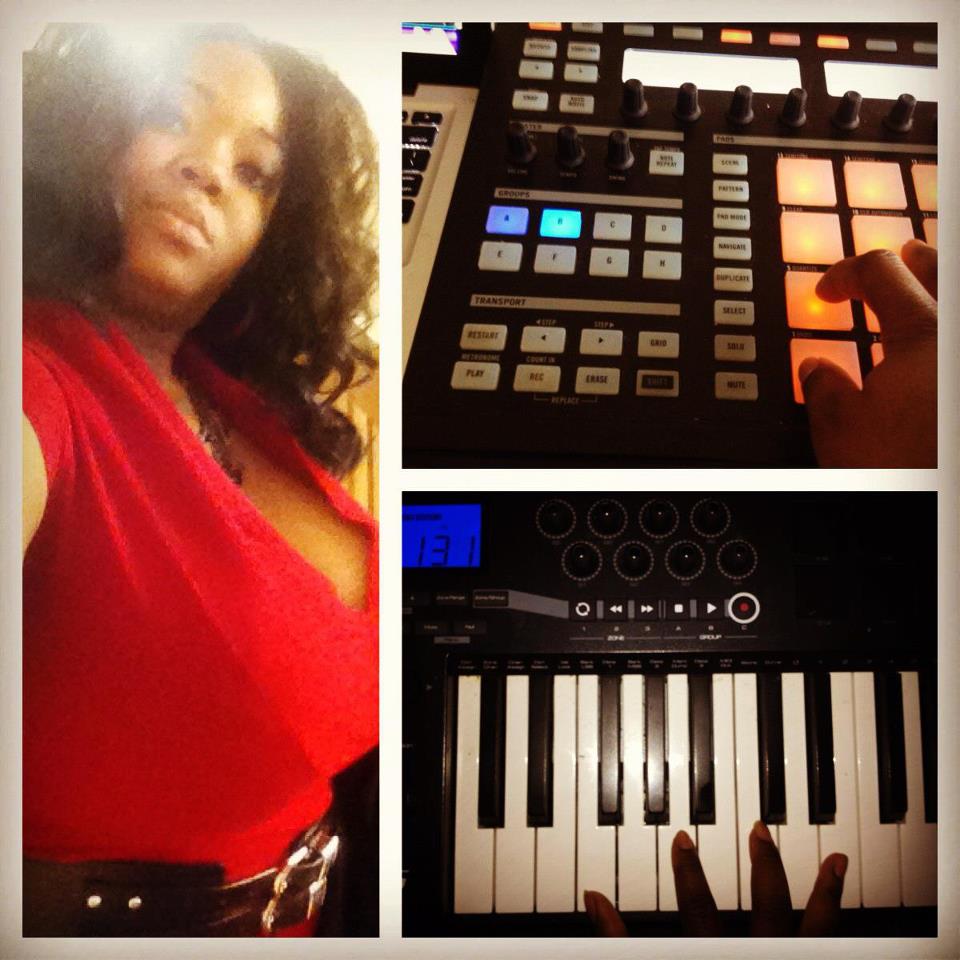
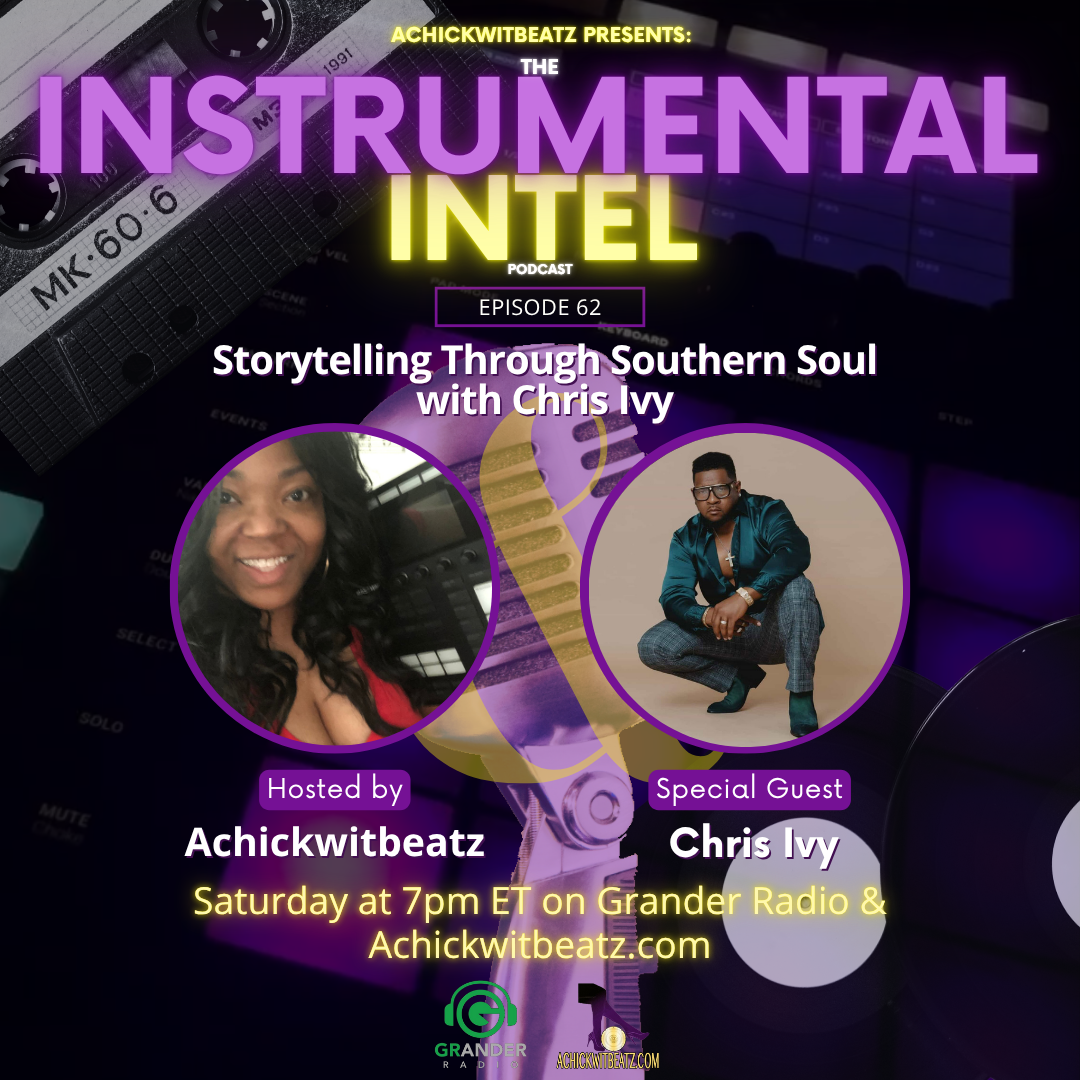






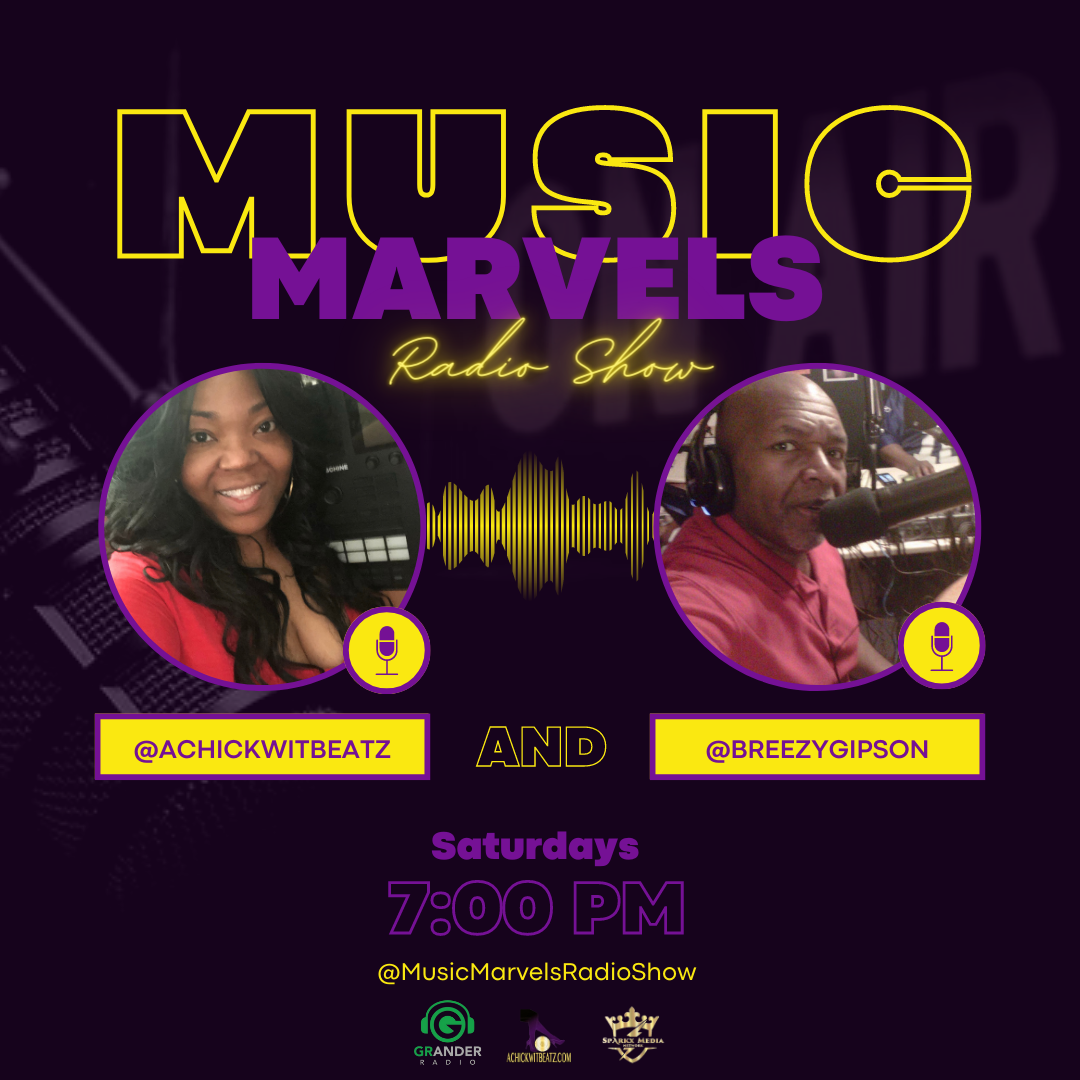
![Hear Here: Achickwitbeatz - Dopamine & Serotonin [Single]](https://images.squarespace-cdn.com/content/v1/52b0b90ae4b0293bfed0d692/1710852808557-EZYGFDIBHLBSIRFOVS1Q/Dopamine+%26+Serotonin.JPG)


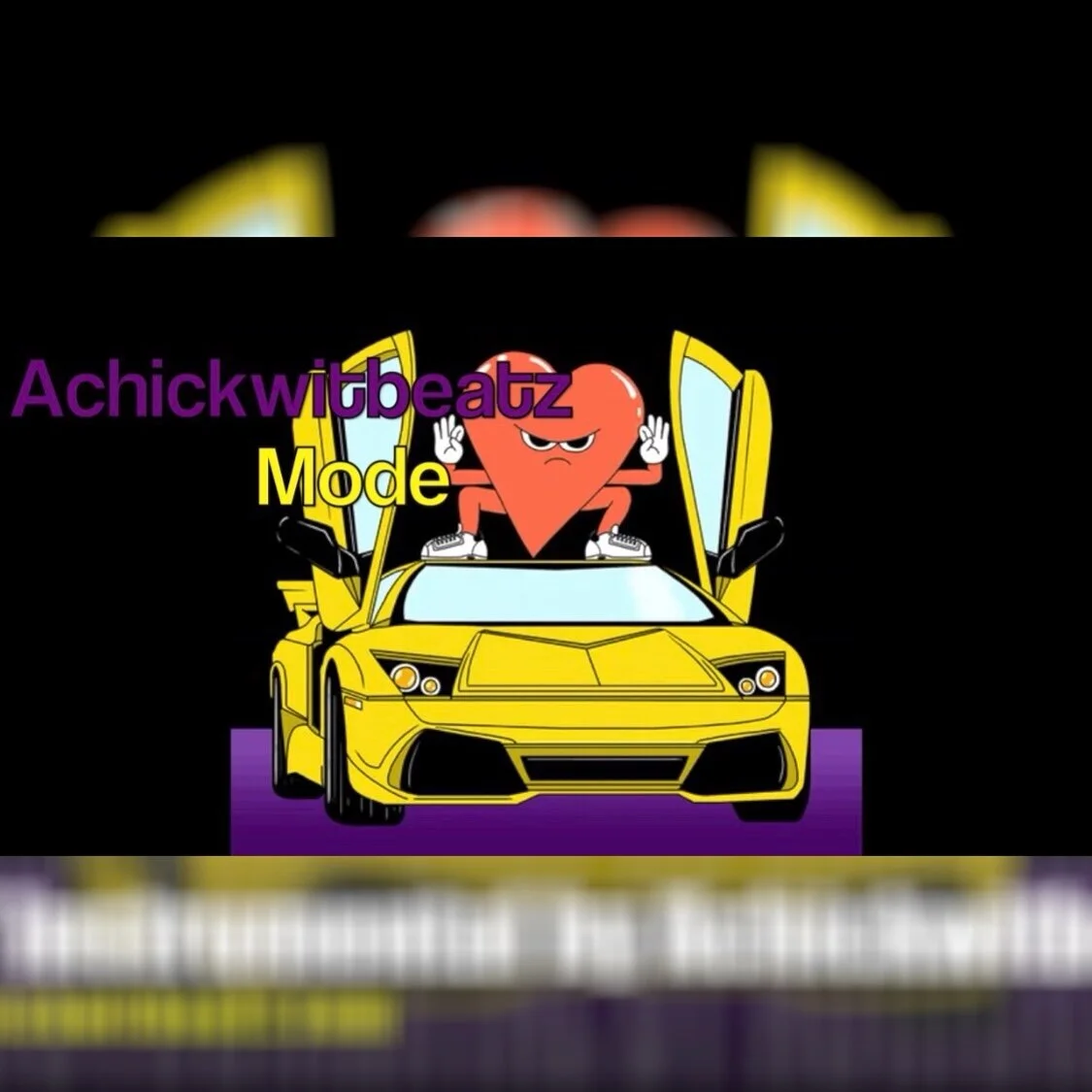
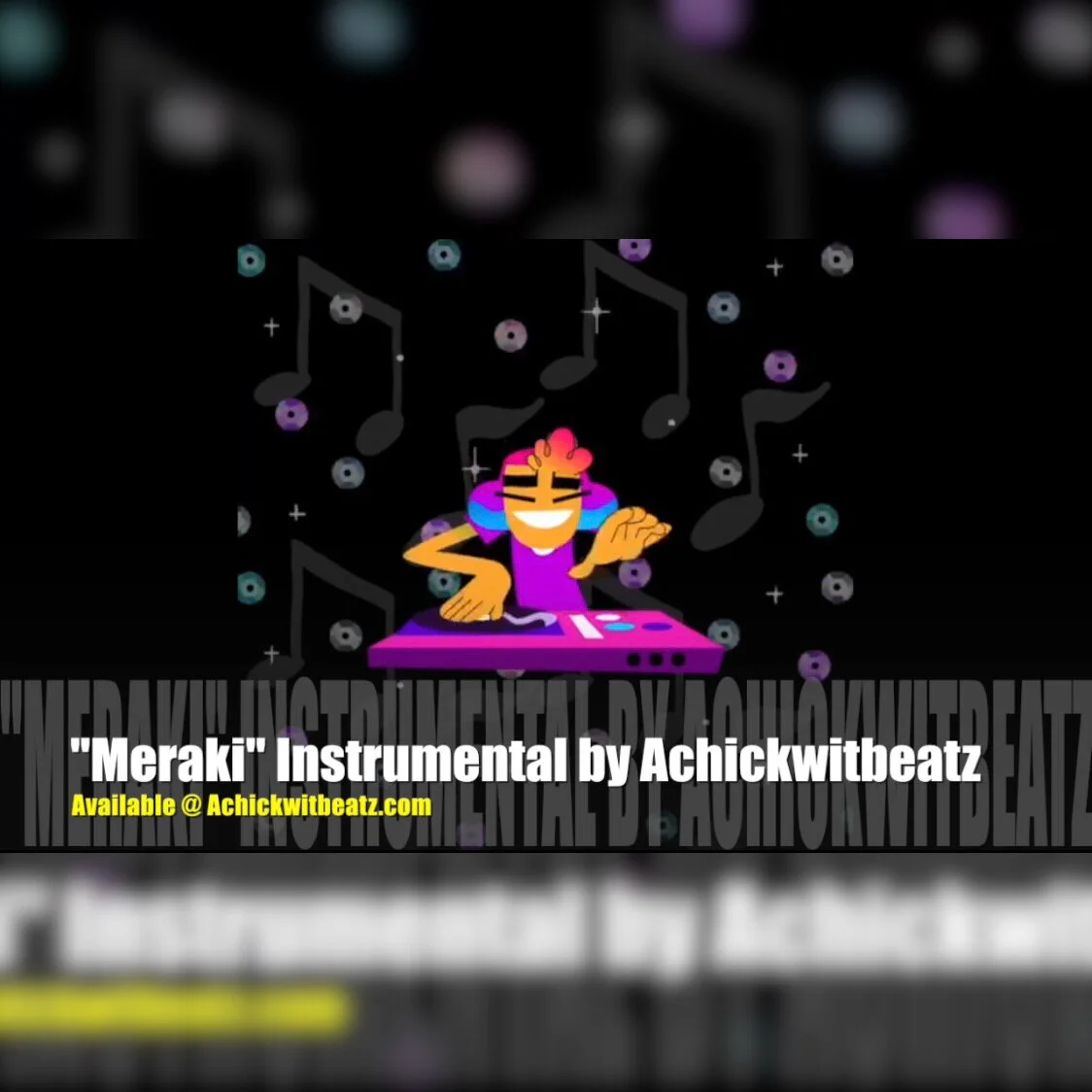





![Hear Here: Dagga Man- "Analytics" [Prod. by Achickwitbeatz]](https://images.squarespace-cdn.com/content/v1/52b0b90ae4b0293bfed0d692/1584638158548-9R55AZLWZIDFJC8LATV6/IMG_2212.JPG)







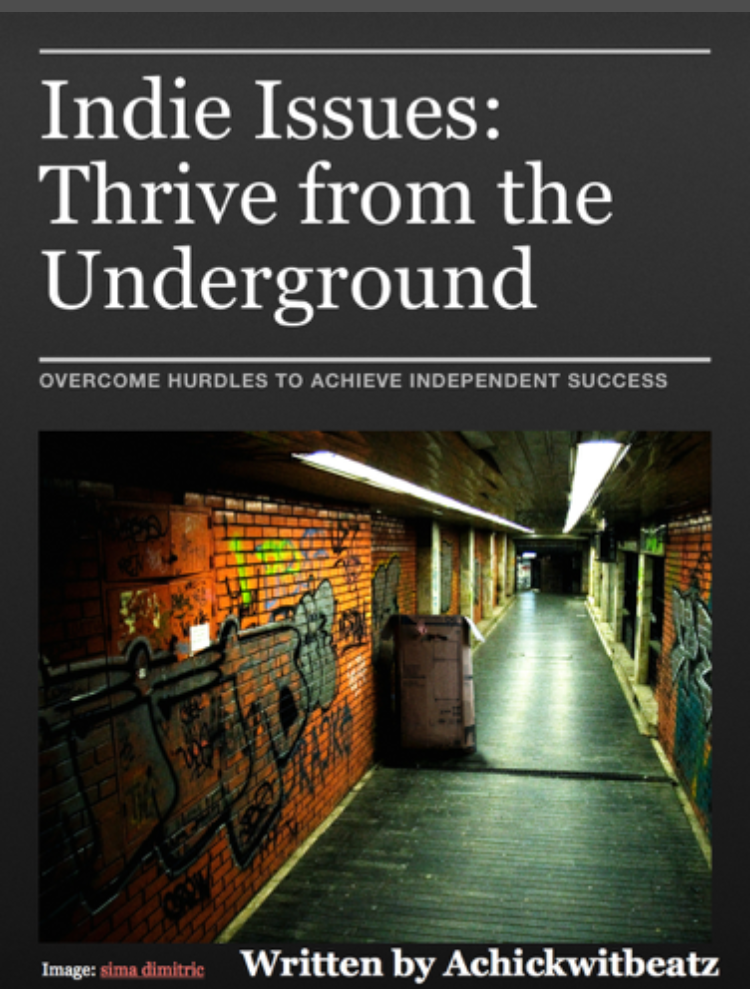
















![Making Music on a Budget [Infographic]](https://images.squarespace-cdn.com/content/v1/52b0b90ae4b0293bfed0d692/1582844361438-3JTE5NT3EL51FHXC0WJI/making-music-on_1929722%25281%2529.jpg)
